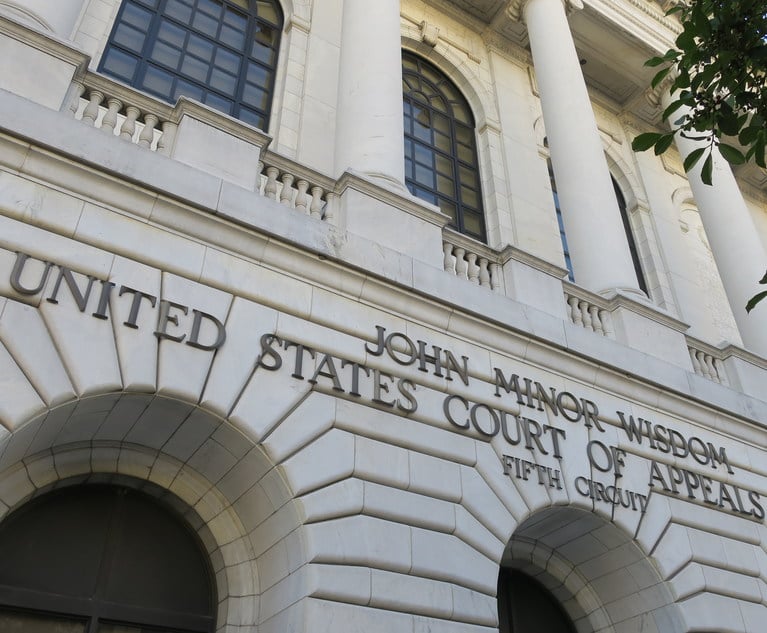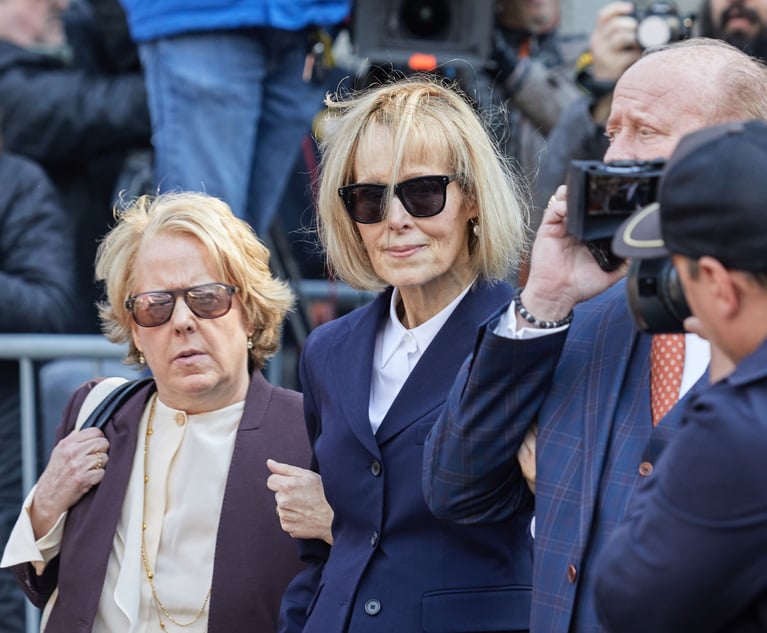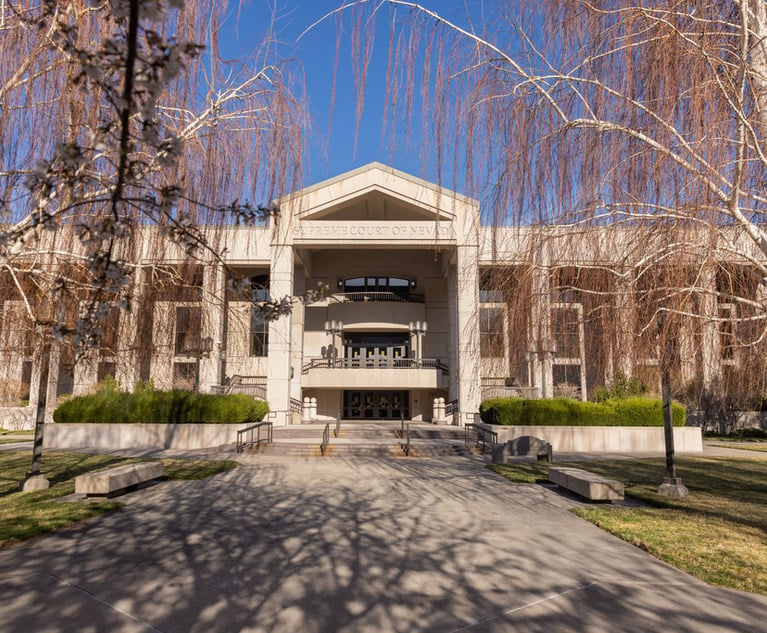Justice Department, Divided Internally, Backed Colorado Baker Over Gay Couple
U.S. Attorney General Jeff Sessions overcame reluctance among top lawyers under his command and pushed forward last week in the U.S. Supreme Court to support a Colorado baker who refused on religious grounds to make a wedding cake for a same-sex couple, according to lawyers with knowledge of the U.S. Justice Department's decision. While it is rare for any U.S. attorney general to countermand the recommendation of the solicitor general, such an action is within the power of the office. The Justice Department disputed that there was any disagreement over the participation of the United States as a friend-of-the-court in the case.
September 15, 2017 at 05:01 PM
10 minute read
U.S. Attorney General Jeff Sessions overcame reluctance among top lawyers under his command and pushed forward last week in the U.S. Supreme Court to support a Colorado baker who refused on religious grounds to make a wedding cake for a same-sex couple, according to lawyers with knowledge of the U.S. Justice Department's decision.

Photo: Diego M. Radzinschi/ALM
Senior lawyers in the civil and civil rights divisions and within the U.S. solicitor general's office said the department should not take a position in the case, the sources told The National Law Journal.
Acting Solicitor General Jeffrey Wall, the Justice Department's top appellate lawyer, filed the amicus brief for the United States on Sept. 7 in Masterpiece Cakeshop v. Colorado Civil Rights Commission, likely one of the most contentious cases of the new term. While it is rare for any U.S. attorney general to countermand the recommendation of the solicitor general, such an action is within the power of the office.
Wall and other current Justice Department lawyers declined to comment about the government's decision to file the brief. A Justice Department spokeswoman, Sarah Isgur Flores, disputed that there was any conflict over the participation of the United States in the case.
“Your information isn't accurate. The department has filed a powerful and well-reasoned brief, which was signed by political leadership and career attorneys in all three components,” Flores said in an email. “The Civil Rights Division, Civil Division, and Solicitor General's Office all agreed on filing the brief.”
In the high court, the baker, Jack Phillips, argues that applying Colorado's anti-discrimination law to him violated free speech and free exercise of religion. The government's brief contends Phillips—as a cake “artist”—cannot be compelled under the First Amendment to create something against his personal beliefs.
“The government may not enact content based laws commanding a speaker to engage in protected expression: An artist cannot be forced to paint, a musician cannot be forced to play, and a poet cannot be forced to write,” the Justice Department's brief said.
Wall was the lead attorney among what former Justice Department lawyers said was an unusually large group of attorneys—eight in all—whose names appeared on the cover of the court filing. Chad Readler, acting head of the civil division, and John Gore, acting head of the civil rights division, also were on the brief. Noel Francisco, the Trump administration's pick for U.S. solicitor general, did not appear on the brief. He has been sidelined from that leadership role while his nomination is pending in the U.S. Senate.
In addition to Wall, Readler and Gore, the other names on the government's brief were: Deputy Assistant Attorney General Hashim Mooppan; Eric Treene, special counsel for religious discrimination; Morgan Goodspeed, an assistant to the solicitor general; Brinton Lucas, counsel to the assistant attorney general, and Justice Department civil appellate attorney Lowell Sturgill Jr.
Absent from the government's Masterpiece Cakeshop brief was any career deputy solicitor general, whose name routinely appears on amicus and merits filings from the Justice Department. Goodspeed, who joined the Justice Department in April from Hogan Lovells, was the only member of the solicitor general's office, besides Wall, on the government's brief.
Readler, Gore, Mooppan and Lucas joined the Trump administration's Justice Department from Jones Day. Former Attorney General John Ashcroft reportedly hired Treene in 2002. Sturgill is a career lawyer who focuses on civil appellate matters.
|The Justice Department's Brief
One factor contributing to a reluctance to file in the case might have been the lack of a strong federal interest, according to former Justice Department lawyers who have read the brief but are not involved in the case.
Masterpiece Cakeshop involves a Colorado state court's interpretation and application of a state anti-discrimination law. One of the friend-of-the-court lawyers who is backing Phillips, Richard Garnett of Notre Dame Law School, said the Justice Department over time has been increasingly “weighing in on cases that are seen as important or of significant public interest, whether or not there is an actual federal interest in the question presented.”
The Justice Department, for instance, under former Attorney General Eric Holder Jr., last year jumped into the case Whole Woman's Health v. Hellerstedt to support a Texas abortion clinic's challenge to a state law restricting clinic operations. The department's position was not pro-government but an argument to limit government power.
Another factor weighing against the Justice Department's participation in Masterpiece Cakeshop is the fact the baker is seeking a First Amendment exception to an anti-discrimination law. The Justice Department, charged with enforcing federal anti-discrimination laws, would not eagerly pursue exceptions to those laws, appellate lawyers said in interviews.
The Supreme Court did not invite the views of the Justice Department, as it generally does when there is an important federal interest or believes those views would be helpful to the resolution of a case. That the Justice Department still filed, despite no invitation, is not uncommon.
Those factors, some legal scholars said in interviews, could explain why the department's brief is narrow and not a full-throated defense of Phillips. The government's brief emphasized only the First Amendment claim. It did not pursue or defend Phillips' religion claims.
“Weddings are sacred rites in the religious realm and profoundly symbolic ceremonies in the secular one,” Wall and the team of DOJ lawyers wrote in the brief. “When Phillips designs and creates a custom wedding cake for a specific couple and a specific wedding, he plays an active role in enabling that ritual, and he associates himself with the celebratory message conveyed.”
Some former Justice Department lawyers said one reason the United States might want to file a brief, despite believing the government should not participate in a case, is from any concern the justices might rule more broadly than the government would like.
The Justice Department's brief in the Colorado case attempted to limit the reach of any ruling by identifying a number of examples—such as race—in which the First Amendment would not trump a state's anti-discrimination law. Still, court scholars said any Supreme Court adoption of the government's argument could “let the genie out of the bottle” and threaten a host of federal anti-discrimination laws.
This content has been archived. It is available through our partners, LexisNexis® and Bloomberg Law.
To view this content, please continue to their sites.
Not a Lexis Subscriber?
Subscribe Now
Not a Bloomberg Law Subscriber?
Subscribe Now
NOT FOR REPRINT
© 2025 ALM Global, LLC, All Rights Reserved. Request academic re-use from www.copyright.com. All other uses, submit a request to [email protected]. For more information visit Asset & Logo Licensing.
You Might Like
View All
Legal Issues to Watch in the US Appeals Courts in 2025

Second Circuit Upholds $5M Judgment Against Trump in E. Jean Carroll Case
4 minute read
Divided 5th Circuit Shoots Down Nasdaq Diversity Rules

Nevada Supreme Court to Decide Fate of Groundbreaking Contingency Cap Ballot Measure
5 minute readTrending Stories
- 1Decision of the Day: Uber Cannot Be Held Vicariously Liable for Driver's Alleged Negligent Conduct
- 2TikTok Law and TikTok Politics
- 3California Supreme Court Vacates Murder Conviction in Infant Abuse Case
- 4New York’s Proposed Legislation Restraining Transfer of Real Property
- 5Withers Hires Lawyers, Staff From LA Trusts and Estates Boutique
Who Got The Work
Michael G. Bongiorno, Andrew Scott Dulberg and Elizabeth E. Driscoll from Wilmer Cutler Pickering Hale and Dorr have stepped in to represent Symbotic Inc., an A.I.-enabled technology platform that focuses on increasing supply chain efficiency, and other defendants in a pending shareholder derivative lawsuit. The case, filed Oct. 2 in Massachusetts District Court by the Brown Law Firm on behalf of Stephen Austen, accuses certain officers and directors of misleading investors in regard to Symbotic's potential for margin growth by failing to disclose that the company was not equipped to timely deploy its systems or manage expenses through project delays. The case, assigned to U.S. District Judge Nathaniel M. Gorton, is 1:24-cv-12522, Austen v. Cohen et al.
Who Got The Work
Edmund Polubinski and Marie Killmond of Davis Polk & Wardwell have entered appearances for data platform software development company MongoDB and other defendants in a pending shareholder derivative lawsuit. The action, filed Oct. 7 in New York Southern District Court by the Brown Law Firm, accuses the company's directors and/or officers of falsely expressing confidence in the company’s restructuring of its sales incentive plan and downplaying the severity of decreases in its upfront commitments. The case is 1:24-cv-07594, Roy v. Ittycheria et al.
Who Got The Work
Amy O. Bruchs and Kurt F. Ellison of Michael Best & Friedrich have entered appearances for Epic Systems Corp. in a pending employment discrimination lawsuit. The suit was filed Sept. 7 in Wisconsin Western District Court by Levine Eisberner LLC and Siri & Glimstad on behalf of a project manager who claims that he was wrongfully terminated after applying for a religious exemption to the defendant's COVID-19 vaccine mandate. The case, assigned to U.S. Magistrate Judge Anita Marie Boor, is 3:24-cv-00630, Secker, Nathan v. Epic Systems Corporation.
Who Got The Work
David X. Sullivan, Thomas J. Finn and Gregory A. Hall from McCarter & English have entered appearances for Sunrun Installation Services in a pending civil rights lawsuit. The complaint was filed Sept. 4 in Connecticut District Court by attorney Robert M. Berke on behalf of former employee George Edward Steins, who was arrested and charged with employing an unregistered home improvement salesperson. The complaint alleges that had Sunrun informed the Connecticut Department of Consumer Protection that the plaintiff's employment had ended in 2017 and that he no longer held Sunrun's home improvement contractor license, he would not have been hit with charges, which were dismissed in May 2024. The case, assigned to U.S. District Judge Jeffrey A. Meyer, is 3:24-cv-01423, Steins v. Sunrun, Inc. et al.
Who Got The Work
Greenberg Traurig shareholder Joshua L. Raskin has entered an appearance for boohoo.com UK Ltd. in a pending patent infringement lawsuit. The suit, filed Sept. 3 in Texas Eastern District Court by Rozier Hardt McDonough on behalf of Alto Dynamics, asserts five patents related to an online shopping platform. The case, assigned to U.S. District Judge Rodney Gilstrap, is 2:24-cv-00719, Alto Dynamics, LLC v. boohoo.com UK Limited.
Featured Firms
Law Offices of Gary Martin Hays & Associates, P.C.
(470) 294-1674
Law Offices of Mark E. Salomone
(857) 444-6468
Smith & Hassler
(713) 739-1250










